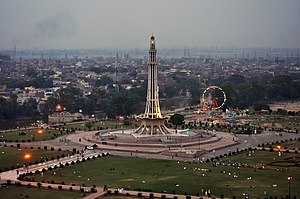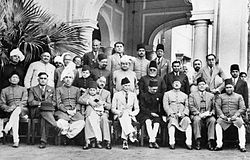| Pakistan Day یومِ پاکستان | |
|---|---|
 Minar-e-Pakistan Minar-e-Pakistan | |
| Official name | Urdu: یومِ پاکستان lit. Yaum-e-Pakistan |
| Observed by | |
| Type | Islamic Republic |
| Significance | Commemoration of Pakistan Resolution and Constitution |
| Celebrations | Full Joint Inter-Services military parade, conferring of Pakistani national honours |
| Observances | Pakistan (Diplomatic missions of Pakistan in other countries) |
| Date | 23 March |
| Next time | 23 March 2025 (2025-03-23) |
| Frequency | Annual |
| First time | 23 March 1940 (84 years ago) (1940-03-23) |
Pakistan Day (Urdu: یومِ پاکستان, lit. Yaum-e-Pakistan) is a national holiday in Pakistan primarily commemorating the adoption of the first Constitution of Pakistan during the transition of the Dominion of Pakistan to the Islamic Republic of Pakistan on 23 March 1956 making Pakistan the world's first Islamic republic, which remains a member state of the Commonwealth of Nations. The day also celebrates the adoption of the Lahore Resolution by the Muslim League at the Minar-e-Pakistan (lit. Pakistan Tower) which called for the creation of an independent sovereign state derived from the provinces with Muslim majorities located in the North-West and East of British India (excluding autonomous princely States) on 23 March 1940.
The day is celebrated annually primarily by Government officials and army staff throughout the country and is a public holiday for civilians. While civilians do not celebrate the public holiday, the Pakistan Armed Forces usually hold a military parade to celebrate both the passing of the Lahore Resolution in 1940 and the Constitution of Pakistan of 1956.
History
Main articles: Lahore Resolution and Iqbal Park
The Muslim League held its annual session at Minto Park in Lahore, Punjab, 23rd March 1940. During this event, the Muslim League led by Muhammad Ali Jinnah and other Founding Fathers narrated the events regarding the differences between Hindus and Muslims, and introduced the historical resolution that cemented the formation of a nation-state in South Asia as Pakistan, even though it did not actually mention Pakistan at all.
The resolution was moved by A. K. Fazlul Huq (26 October 1873 – 27 April 1962), often called Sher-e-Bangal, passed on 23rd March and had its signatures from the Founding Fathers of Pakistan. It reads as:
No constitutional plan would be workable or acceptable to the Muslims unless geographical contiguous units are demarcated into regions which should be so constituted with such territorial readjustments as may be necessary. That the areas in which the Muslims are numerically in majority as in the North-Western and Eastern zones of India should be grouped to constitute independent states in which the constituent units shall be autonomous and sovereign.
The British plan to partition the Indian subcontinent into two dominions - India and Pakistan - was announced on 3 June 1947. In the event, Pakistan was created on 14 August 1947 and Indian independence came a day later. Pakistan was immediately identified as a migrant state born amid bloodshed. Muhammad Ali Jinnah, the founder of Pakistan, became the first Governor-General of Pakistan with Liaqat Ali Khan becoming the first Prime Minister of Pakistan. The Indian Act of 1935 provided the legal framework for Pakistan until 1956, when the state passed its own constitution.
While Pakistan's Independence Day celebrates its freedom from British rule, the Republic Day celebrates the coming into force of its constitution.
Works and efforts by the Basic Principles Committee drafted the basic outlines of the constitution in 1949. After many deliberations and years of some modifications, the first set of the Constitution of Pakistan was enforced in the country on 23 March 1956. This marked the country's successful transition from Dominion to Islamic Republic. The Governor-General was replaced with the President of Pakistan as ceremonial head of state. Initially it was called Republic Day but after Ayub Khan's takeover its name was changed to Pakistan Day due to the end of democracy in Pakistan.
Celebrations
| This section needs additional citations for verification. Please help improve this article by adding citations to reliable sources in this section. Unsourced material may be challenged and removed. Find sources: "Pakistan Day" – news · newspapers · books · scholar · JSTOR (March 2019) (Learn how and when to remove this message) |
The main celebration is held in Islamabad, the capital of Pakistan. The President of Pakistan is usually the Chief Guest; also in attendance are the Prime Minister of Pakistan alongside the Cabinet ministers, military chiefs of staff, and chairman joint chiefs.
A full inter-services joint military parade is rehearsed and broadcast live by the news media all over the country. The Pakistan military inter services also gives a glance of its power and capabilities during this parade.
The celebrations regarding the holiday include a full military and civilian parade in the capital, Islamabad. These are presided by the President of Pakistan and are held early in the morning. After the parade, the President confers national awards and medals on the awardees at the Presidency. Wreaths are also laid at the mausoleums of Allama Sir Muhammad Iqbal and Quaid-i-Azam Muhammad Ali Jinnah, founder of Pakistan. In very rare times and significance, foreign dignitaries have been invited to attend the military parade.
In the United States, while New York City has celebrated North America's largest Pakistan Day parade for decades, New Jersey's first annual Pakistan Day parade was held on August 16, 2015, in Edison and Woodbridge, New Jersey.
Parade Commanders
From 1956 to 2018, the following officers from the army have led the joint services parade:
| Year | Officer | Unit | Notes |
|---|---|---|---|
| 1983 | Brigadier Nasir Khan | 1st Punjab Regiment | . |
| 1987 | Brigadier Afzal Janjua SJ | FF Regt | Later Lt. Gen. |
| 1989 | Brigadier Yasub Dogar | 2 FF Regiment (Guides) | |
| 1996 | Brigadier Naveed Nasr | 17 Punjab Regiment | Also commanded 70 Punjab |
| 1997 | Brigadier Javed Iqbal | 18 Field Regiment | MS to Nawaz Sharif in 1999 |
| 1998 | Brigadier Akram Sahi | FF Regt | Later Maj. Gen. |
| 1999 | Brigadier Muhammad Sarmad Ibrar | 3 Baluch Regt | Later Lt. Gen. |
| 20xx | Brigadier Badar Munir | 5 AK Regt | |
| 2005 | Brigadier Naushad Kiani | Punjab Regt | Later Maj. Gen. |
| 2007 | Brigadier Tariq Ghafoor | FF Regt | Later Maj. Gen. |
| 2008 | Brigadier Ihsan ul Haq | Later Maj. Gen. | |
| 2015 | Brigadier Khurram Sarfaraz | 27 Baluch Regt | |
| 2016 | Brigadier Amir Majeed | 29 AK Regt | |
| 2017 | Brigadier Amer Ahsan Nawaz | 3 Baluch Regt | Now Lt. Gen. |
| 2018 | Brigadier Abdul Saboor Hasan | 19 FF Regt |
Foreign dignitaries who have attended the parade
From 1956 to 2019, the following foreign dignitaries attended the parade:
| Foreign dignitary | Guest of Honour | Country | Notes |
|---|---|---|---|
| 1985 | General Rudini | Chief of staff Indonesian Army | |
| 1987 | Robert Mugabe | President of Zimbabwe | |
| 1996 | Cassam Uteem | President of Mauritius | |
| 1997 | OIC Heads of States | OIC Members | To attend Extra-Ordinary OIC Summit |
| 2005 | Hamid Karzai | President of Afghanistan | |
| 2018 | Maithripala Sirisena | President of Sri Lanka | |
| 2019 | Mahathir Mohamad | Prime Minister of Malaysia |
Foreign contingents
| Year | Contingent | Country |
|---|---|---|
| 1956 | Janissary Military Band | |
| 1956 | Iran Military Contingent | |
| 1956 | Turkish Military Contingent | |
| 1997 | Janissary Military Band | |
| 2017 | Beijing Garrison Honor Guard Battalion | |
| 2017 | Janissary Military band | |
| 2018 | Saudi Arabian Special Forces | |
| 2018 | UAE elite unit | |
| 2018 | Jordanian Armed Forces Band | |
| 2019 | Azerbaijan Army | |
| 2019 | People's Liberation Army Air Force | |
| 2019 | Turkish Air Force | |
| 2019 | Saudi Arabian Army (Paratroopers) | |
| 2019 | Sri Lanka Army (Paratroopers) | |
| 2019 | Royal Bahraini Army (Paratroopers) | |
| 2019 | Royal Brunei Land Forces (Paratroopers) |
See also
Notes and references
- Official name is (Urdu: Urdu: یومِ پاکستان, lit. Yaum-e-Pakistan) or Pakistan Day in English. The day also commemorates Joint Inter-Services parade. Unofficially, the day is also known as 23 March
Citations
- ^ John Stewart Bowman (2000). Columbia chronologies of Asian history and culture. Columbia University Press. p. 372. ISBN 978-0-231-11004-4. Retrieved 22 March 2011.
- Olson, Gillia (2005). "Holidays". Pakistan : a question and answer book. Mankato, Minn.: Capstone Press. ISBN 0736837574.
- Singh, Sarina; et al. (2008). Pakistan & the Karakoram Highway (7th ed.). Footscray, Vic.: Lonely Planet.
- Rizvi, Hasan Askari (23 March 2015). "Pakistan and March 23". No. Special works published by Dr. H.A. Rizvi. Express Tribune, Rizvi. Express Tribune. Retrieved 23 March 2015.
- ^ Agencies (23 March 2012). "Nation celebrates Pakistan Day today". The Nation. Archived from the original on 25 April 2012. Retrieved 23 March 2012.
- DAWN.com (23 March 2015). "Pakistan holds first Republic Day parade in seven years". Dawn News, 2015. Dawn. Retrieved 23 March 2015.
- Programme of the All India Muslim Leagues 27th Annual Session, to be held at Lahore 21 to 24 March 1940, at the National Archives of Pakistan, Islamabad, the Quaid i Azam Papers, File 1354
- Syed Iftikhar Ahmed (1983), Essays on Pakistan, Alpha Bravo Publishers, Lahore, OCLC 12811079
- The Pakistan Resolution, Government of Pakistan Official website. (Retrieved on 23 April 2006)
- Cohen, Stephen P. The idea of Pakistan. Brookings Institution Press, 2004.
- Hussain, Rizwan. Pakistan. Archived from the original on 21 November 2008.
{{cite book}}:|work=ignored (help) - Ghazali, Abdus Sattar. "The First Islamic Republic". Islamic Pakistan: Illusions and Reality. Islamabad: National Book Club. Retrieved 21 March 2018.
- Staff work (22 March 2015). "Preparations complete for Pakistan Day parade on March 23". NewsTribe, 2015. NewsTribe. Archived from the original on 23 March 2015. Retrieved 24 March 2015.
- ^ DAWN.com (24 March 2015). "Pakistan holds first Republic Day parade in seven years". Dawn Newspapers, 2015. Dawn Newspapers. Retrieved 24 March 2015.
- Dawn.com (24 March 2015). "Relive Pakistan Day: 1940 – 2000". Dawn archives, 2015. Dawn archives. Retrieved 24 March 2015.
- Ed Murray (16 August 2015). "Pakistan Day Parade a display of pride in their heritage and America". New Jersey On-Line LLC. Archived from the original on 19 August 2015. Retrieved 16 August 2015.
- Michelle Sahn (15 August 2015). "ICYMI: Pakistan Day Parade To Be Held Sunday In Woodbridge, Edison". Woodbridge Patch. Archived from the original on 17 August 2015. Retrieved 16 August 2015.


